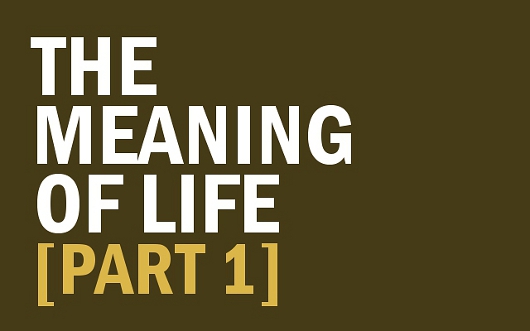The Meaning of Life? 4 Options in 4 Video Clips
Each month around 550,000 of us search the phrase ‘meaning of life’ on Google. And we’re not all looking for the Monty Python film. Does life have any meaning? Does my life have any meaning? All of us at some stage ponder such questions.
I’ve written an article on our search for meaning for Christianity Magazine this month. (The full text is available online for a limited time. Go get it!) In it I suggest that our culture offers four main answers to the question of life’s meaning, as reflected in our stories and films. Here are some clips to illustrate.
1. Life is About Living in Harmony with ‘God’
This is the broadly religious answer—so broad in fact it can be uttered by priest, imam and New Age guru alike. This answer doesn’t get the cultural attention it once did, as in films like Ordet or The Ten Commandments, but it does still surface.
Terrence Malick’s The Tree of Life heads in this direction, with its subtle encouragement to look for divine grace in the midst of life’s pain. Xavier Beauvois’ Of Gods and Men reflects this answer from a broadly Christian perspective, God Lives in the Himalyas from a Hindu angle, and What The Bleep Do We Know and The Secret in a New Age/new spirituality sense. And in one of the most blatant portrayals of this answer in recent years, we find Bruce Nolan bending the knee then coming to some conclusions about what life is all about:
If we come to the conclusion that life is about living in harmony with God, we’ll soon need to ask some further questions:
- Which God? The ‘impersonal energy’ of The Secret or the personal being implied by Bruce Almighty?
- Does this God make any sense of suffering?
- How does one live in harmony with this deity?
2. Life is a Joke. It Has No Meaning
Following the nihilistic philosophers of the 19th and 20th centuries, this answer sees no divine being to live in harmony with and no inherent meaning to the universe or our lives. Samuel Beckett’s Waiting for Godot in theatre, the Dada movement in art, Hitchhikers Guide to the Galaxy in fiction, punk in music, and even Seinfeld in TV (which was, after all, a show about ‘nothing’) reflect this answer.
As does Charlie Kaufman’s dark film Synecdoche, New York. In it theatre director Caden Cotard creates a real-time stage play re-enacting his everyday life in the hope of discovering its meaning. In this final scene, an old and ill Caden reviews the now defunct set of his life while a mysterious stage director speaks to him through an ear piece:
This answer also leads to more questions. If life has no meaning:
- Why do we long for meaning so much?
- Why do happiness studies all seem to say the same thing—that we need good relationships, some goals, to serve others, and find spirituality to enjoy life? Don’t such studies suggest that there is some meaning in life to be found?
3. Life’s Meaning is Whatever You Make it
This is perhaps our most popular answer to the meaning of life today. As the T-shirt reads, ‘The meaning of life is to make life meaningful’. If life has no meaning in itself then meaning has to be made, and having dreams, setting goals, pursuing relationships, serving others and actualising our potentialities are the activities most often suggested to achieve it.
This answer is the underlying belief of a thousand self-help books, hundreds of hit songs, and the basic teaching of most personal development courses. It is often the essence of those sappy YouTube clips about ‘life’ you find posted on Facebook. Like this one:
There is much truth to this answer as meaning can be found in so many of these things. But I have spoken to plenty of people who’ve had all they wanted yet still lacked meaning. So, a further question to ask is:
- What if (God forbid) I lost the dream job, my partner or my family? What if I lost my health and couldn’t create or serve? What meaning would be left?
4. The Meaning of Life is a Mystery
For some, the answers are simply beyond our reach. Popular culture reflects this often. Homer Simpson once asked God what the meaning of life was. As God started to reply the credits rolled and the show ended! Yann Martel’s Man-Booker Prize-winning novel [amazon_link id=”0156027321″ target=”_blank” container=”” container_class=”” ]Life of Pi[/amazon_link] is an extended exploration of life’s meaning but leaves the reader with more questions than answers.
In David Russell’s film I Heart Huckabees, Albert and Tommy employ ‘existential detectives’ to help them discover the meaning of their lives. Tommy is most confused about it!
While I Heart Huckabees ends a little less chaotically than it begins, the best Albert and Tommy can conclude is that there might be some ‘magic in the manure’ of life to be found. Life’s meaning ultimately remains a mystery.
Over to You
If you’ve read the Christianity article you’ll know where I head next. I’ll expand that further in Part 2 of this series. But right now, here’s an exercise and some questions for you:
- Finish this sentence in your own words: The meaning of life is…
- Which answer above best describes your understanding of life’s meaning?
- Have you ever moved from one answer to another?
- Have I missed anything? Tell me now






Toppinjasonandrew
THE MEANING OF LIFE IS HAVING JESUSE IN YOUR LIFE AND LOVEING GOD AND LOVING PEOPLE!!!!!!!!!!!!!!!!!!!!!!!!!!!!!!!!!!!!!!!!!!
Sheridan Voysey
Do try to show more enthusiasm, Jason :). Thanks.
Nic Irvine
You’ve got it sussed – because you added “people”. The greatest commandments, says Jesus, are love God and love people. If we’re only here to love God then there is no meaning to life at all – we might as well bypass life and go to Heaven. God is a Trinity. We are made like him – we need relationships. Unfortunately (groan) we need the learning curve. The joy > grief cycle of life is and must be experienced with other people. We are designed like that, for relationships – hence human babies are born helpless continuing for several years, and need a committed parent. Compare us to animals that can walk only hours after they’re born. Don’t go thinking that a winning streak for the animals! We all need love don’t we? I reckon when we get to Heaven God will ask us how me rate ourselves against those two commandments. We’ve got to learn how to love other people. Otherwise we might just be stuck with them for eternity (or them with us – oh dear!)
Sheridan Voysey
Thanks Nic. I fully agree – relationship with God and others is at the heart of life’s meaning. More on that in Part 2.
Toppinjasonandrew
LIFE FOR ME IS JESUS AND IT WILL ALWAYS REMAIN THOUS!!!!!!! I LOVE JESUS AND N MY LIFE!!!!!!!!!!!!!!!!!!!!!!!!!!!!!!!!!!!!!!!!!!!!!!!!! I WILL USE WORDS FROM A SONG HAT JESUS HAS PUT IN MY HHEART> “THERE IS A HOPE, THAT BURNS WITGHIN MY HEART< THAT GIVES ME STRENGETH FOR EVERY PASSING DAY I TAKE INSPRATION AND COMFORT FROM TOE WORDS OF THERE IS A HOPE> PLEASE GOOGLE THERE IS A HOPE BY STURAT TOWNEND AND YIU WILL SEE WHAT I MEAN AND YOU WILL START SINGING THERE IS A HOPE TRUST ME!!!!!!!!!!!!!!!!!!!
Anonymous
I outlined my thoughts about the purpose of life, from the perspectives of both a believer and a non-believer, and reading your highly analytical and intriguing article has just triggered a realization…
From the perspective of a non-believer, the belief that God breathes spiritual life into our otherwise mundane existence, weaves us into His divine plan, and uses us to achieve magnificent ends, appears to come under the category of ‘Life’s purpose is whatever you define it to be.’ I.e. the faithful among us have defined the purpose of life according to what we humans postulate to be in keeping with God’s vision.
From the perspective of a believer, on the other hand, our tendency to be human-centric and define things to suit our mortal goals and whims, is a product of our narrow perspective, and thus covers a smaller scope than ‘Life’s purpose is to live with God.’
For the non-believer, God’s plan is seen as an artefact of the human imagination, and His existence is seen as a representation of a non-existent entity in our minds, therefore God’s plan is a subset of man’s design (Man > God). Whereas for the faithful, the opposite is true- man’s plan is a subset of God’s (God > Man).
Is it possible to ‘zoom out’ and adopt a perspective that extends beyond our human frame of reference? Or are we forever relegated to the chicken-and-the-egg problem, because our understanding can’t possibly surpass the limits of human comprehension, yet we claim that something greater exists- while being incapable of defining or grasping what that something is?
Read on for more:
http://www.helpshedthefaith.com/hstf26.html
Sheridan Voysey
Nice to see some further wrestling on this. Thanks.
Sheridan Voysey
Pity this is spam, otherwise you might’ve had something valuable to add to the conversation.